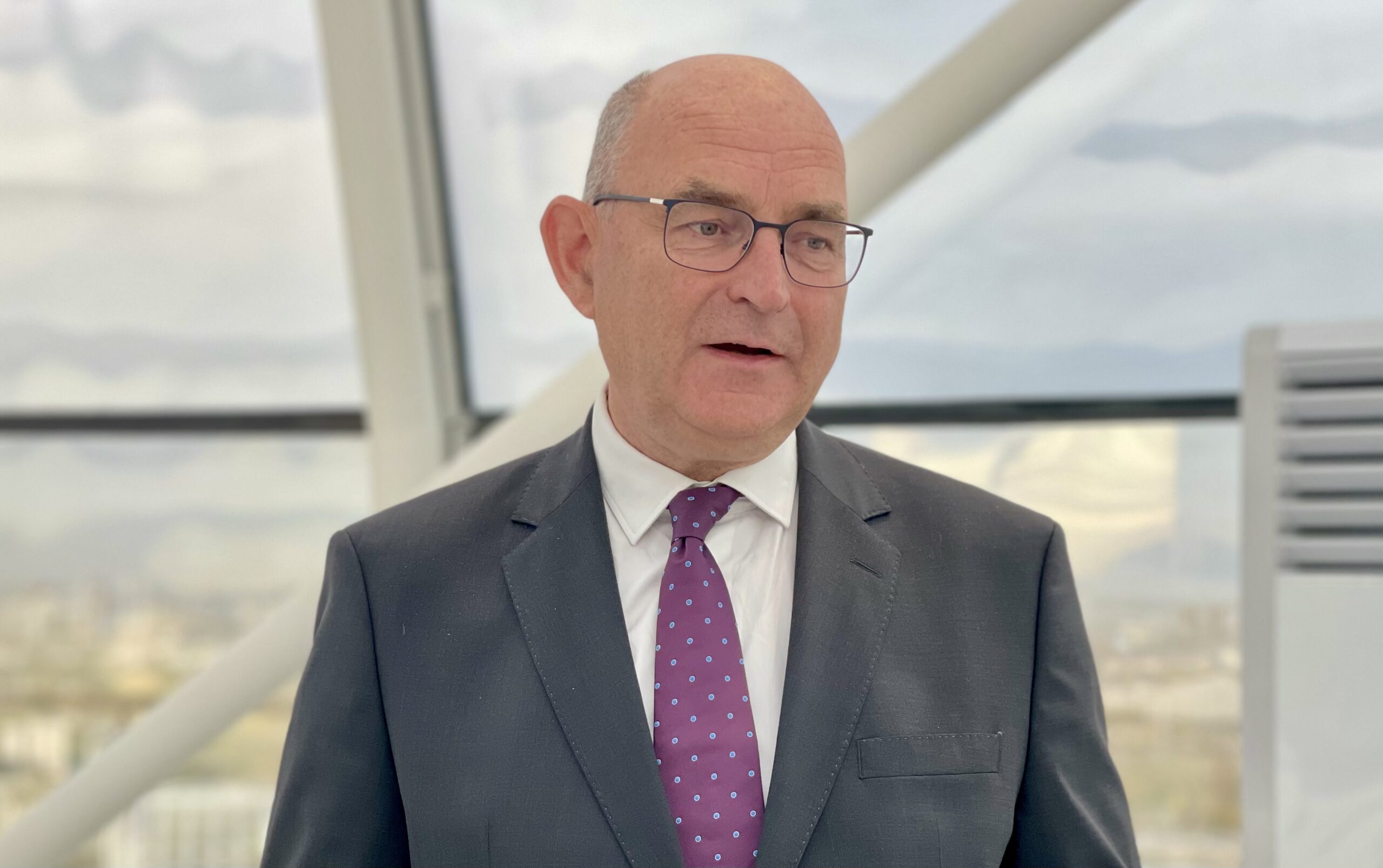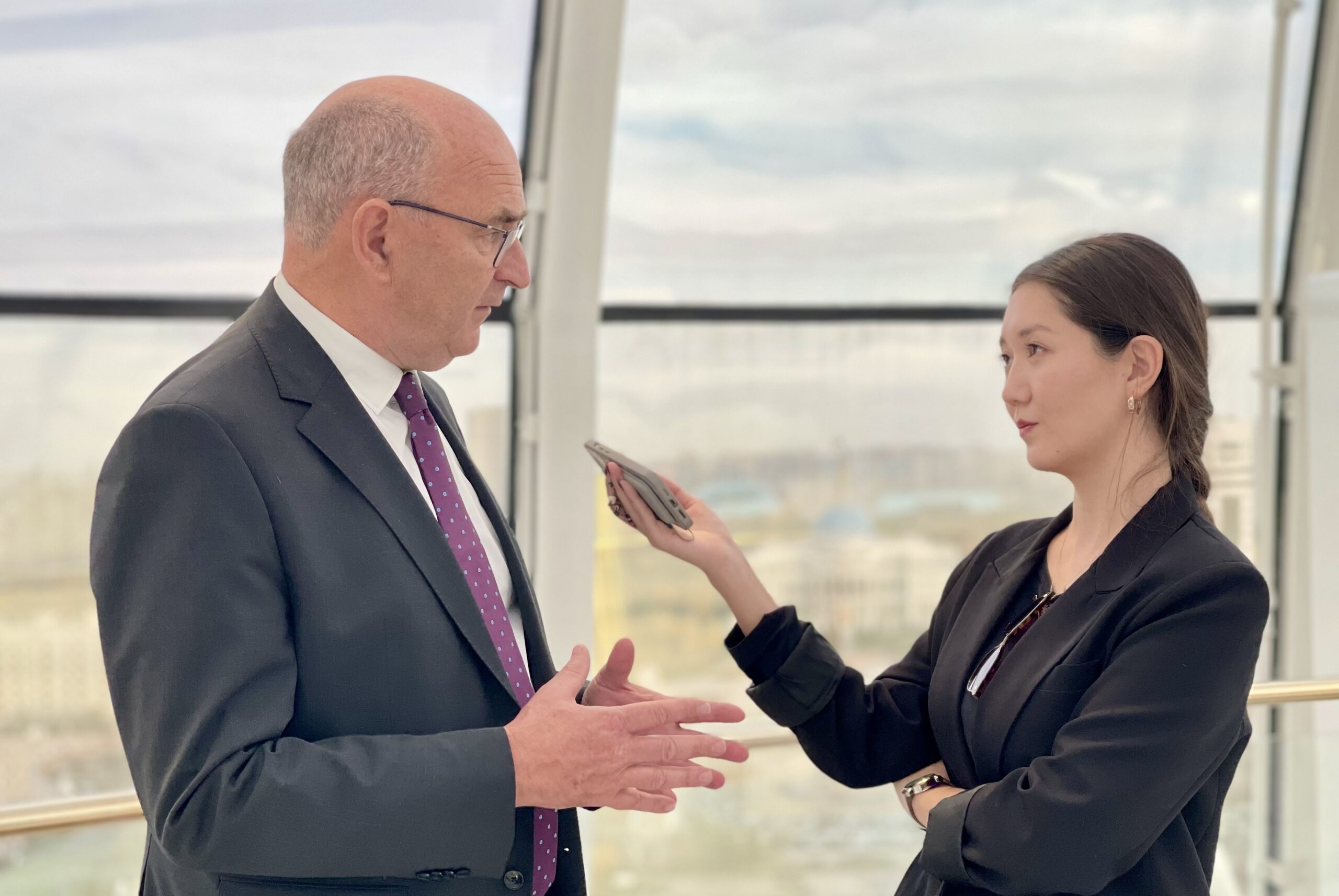ASTANA — A Dutch trade mission representing seven companies from key sectors visited Kazakhstan from Oct. 7-10 to explore new port development and logistics opportunities along the Trans-Caspian International Transport Route (TITR), also known as the Middle Corridor. In an interview with The Astana Times, Henk Nieboer, the Chairman of the Netherlands Kazakhstan Business Association and mission leader, discussed the Netherlands’ growing commitment to strengthen collaboration between the two countries’ private and public sectors on critical infrastructure and Europe-Asia trade routes.

Henk Nieboer, the Chairman of the Netherlands Kazakhstan Business Association and the trade mission leader. Photo credit: Aruzhan Ualikhanova / The Astana Times
The Netherlands-Kazakhstan trade mission, consisting of 16 representatives, including officials from the Dutch Ministry of Foreign Affairs and the Netherlands Enterprise Agency (RVO), aimed to explore the development of transport corridors in Kazakhstan. The mission visited Aktau and Astana to learn about Kazakhstan’s logistics landscape.
“This interest was sparked during the January visit of Kazakhstan’s Minister of Transport, Marat Karabayev, to the Netherlands, where plans to develop this route were discussed. As a European leader in logistics, the Netherlands is keen to explore these new opportunities. In response, we organized a trade mission with seven companies to explore potential partnerships and engage with policymakers here,” said Nieboer.
Nieboer, having almost 20 years of hands-on experience in doing business in Kazakhstan, noted that after thorough research done by the RVO, the operational arm of the ministry, he “did not have to think more than two seconds to say yes” to accept the offer to lead the mission.

In an interview with The Astana Times, Henk Nieboer discusses the Netherlands’ growing commitment to strengthen ties with Kazakhstan. Photo credit: Aruzhan Ualikhanova / The Astana Times
“I have built many relationships here, worked with Kazakh companies and witnessed their growth. It is always exciting to come back, reconnect with old friends and make new ones,” he said.
Nieboer also emphasized a remarkable journey of collaboration, which encompassed the establishment of new cooperative programs in water management between the two countries following recent floods in Kazakhstan.
“For the Ministry of Foreign Affairs, addressing such critical issues is a priority, as they seek to expand collaborations in this area and identify other key topics for future partnerships. The aim is to bring more experts to Kazakhstan and foster new initiatives,” said Nieboer.
The mission’s program in Aktau focused on port infrastructure. From Oct.7-8, the delegation visited the ports of Aktau and Kuryk and Ersai Caspian Yard, a major offshore and logistics hub, and met with the Mangystau Region officials.
In Astana, the mission’s agenda shifted to policy discussions and networking, hosting the first Kazakhstan-Netherlands Business Council on Oct. 9. The event served as a platform for Dutch companies and Kazakh officials to exchange ideas on logistics and port development.
“We also attended Translogistica Expo, where some of our companies participated. They were very active in reaching out to new partners. Some of them even missed parts of the official program due to other productive meetings,” Nieboer remarked, reflecting on the enthusiasm of the Dutch business community.
Mission companies cover all aspects of development
The seven companies in the Netherlands trade mission included APM Terminals, Boekestijn Transport Service, CF&S Netherlands B.V., Dieseko Group BV, Meever&Meever, Van Oord Dredging & Marine Contractors B.V. and Witteveen+Bos.
Nieboer noted that developing an international transport corridor is a multidisciplinary effort. It involves building infrastructure, such as roads, bridges, railways, and ports and having operators manage the logistics.
“A comprehensive legal framework must be established to facilitate operations, along with efficient customs procedures and state-of-the-art IT systems for tracking containers. Operators for terminals, such as those being developed in Kuryk, are also essential,” said Nieboer.
“Our group of seven companies covers the entire spectrum. We have firms specializing in design, planning and construction, others that supply equipment, and some that act as operators—whether transport companies, terminal managers, or investors. Though small in number, we represent a wide range of expertise,” added Nieboer.
Lesson from the Netherlands: Efficiency in multimodal logistics
Nieboer shared insights from the Netherlands’ experience with multimodal logistics. Rotterdam, Europe’s largest seaport, handles a significant portion of the continent’s trade, transporting goods from the port to the hinterland through various methods, including shipping, inland shipping, rail and road freight.
“We excel in organizing these multimodal logistics chains using advanced technology. Competition among ports in Northwestern Europe is intense, driving innovation and the need for greater efficiency. What we have developed in that process can be applied to other countries, particularly in the Middle Corridor,” said Nieboer.
During the council meeting, it was shown that transit times for containers have already been significantly reduced, but there is still room for further improvement. According to Nieboer, scaling operations and increasing efficiency will help to minimize these transit times further.
He also noted the potential for collaboration by sharing the Netherlands’ experience with multinational transport corridors. In the European Union (EU), several such corridors have operated since the early 1990s.
“We can help conceptualize the necessary international agreements and improve customs operations so containers are not repeatedly checked in every country, saving both time and manpower. This will ultimately make the Middle Corridor more competitive,” added Nieboer.
Next steps: Building partnerships, broader cooperation
Looking forward, Nieboer noted that each company has its own ambitions, and many have already formed new partnerships they wish to develop further. Some companies have identified concrete business opportunities, such as supplying materials to Kazakhstan to construct new facilities.
“There is also an idea to form a consortium of these companies, potentially including other Dutch businesses. This consortium could serve as an integral partner for any entity involved in logistics and port development,” said Nieboer.
Additionally, Nieboer pointed out that the RVO and the Ministry of Foreign Affairs plan to organize a follow-up mission to Georgia, focusing on logistics and the Middle Corridor.
“Given the positive outcomes of this mission, we see growing interest in expanding our partnerships along the corridor,” said Nieboer, noting the Netherlands’ commitment to deeper engagement in Central Asia’s logistics sector.
